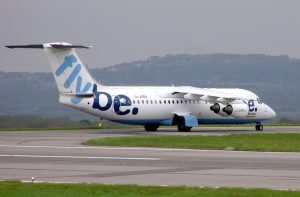Our local politicians are very pleased Flybe has been saved:
Regional connectivity safeguards Flybe future | eastdevon.gov.uk
.
The local press have been giving a local perspective:
A controversial and turbulent week for Flybe in Devon and Cornwall | Cornwall Live
.
And the national press have a huge amount to say about it:
Why Did The Government Save Flybe? | The Speaker
Flybe: Viable business or destined to fail? | BBC News
The politics may be murky, but if Flybe failed many regions would be badly hit | The Guardian
.
The commentary gets interesting – for example, from the Times:
.

Boris Johnson is winging it with Flybe bailout
Debenhams’ 25,000 staff can rest easy: if the retailer gets into trouble again this year, having already undergone one insolvency procedure, Boris Johnson will surely step in to defer its VAT payments and provide an emergency loan.
I am being only slightly flippant. The government’s hurried bailout of Flybe last week, politically expedient given the regional airline’s key role connecting cities in the southwest and the north, raises more questions than answers. Why did ministers decide Flybe — owned by Sir Richard Branson’s Virgin Atlantic, Cyrus Capital and Stobart — was worth saving when Thomas Cook wasn’t?
Boris Johnson is winging it with Flybe bailout | The Times
.
And several commentators have noted that the government seems to be abandoning a thirty-year reluctance to interfere in the economy on such a scale:
State rescue will not fly, say Flybe rivals | Financial Times
Flybe rescue collides with free market principles | The Times
.
The FT editorial makes the point that Brexit saved the airline:
.
Misguided Flybe rescue sets a damaging precedent
Boris Johnson’s government came to power with help from voters in the Midlands and northern England who had never before backed the Conservatives, and a manifesto commitment to improve “connectivity”. So the warning that Flybe — which provides the only flights to some locations that are hard to reach by road or rail — was in danger of collapse posed a tricky test. Saving it was politically expedient. But while the government deal to support the regional airline involved no direct injection of public money, the decision was wrong-headed…
The rescue deal has also set a dangerous precedent. By touting the prospect of an embarrassing business failure in a highly sensitive area for the government, Flybe’s deep-pocketed owners have extracted an important concession. Any operator of a struggling business that is vital to a regional economy — especially amid the upheavals caused by Brexit — may now be tempted to try a similar approach.
Mr Johnson already signalled last year that the UK plans to break free from European state aid rules after it leaves the EU, making it easier to prop up ailing industries. It would be unfortunate if Flybe proved to be a model for the government’s new approach.
Misguided Flybe rescue sets a damaging precedent | Financial Times
.
As well as upsetting the free-market fundamentalists, the green lobby will not be happy:
Don’t sacrifice Flybe to the eco-warrior mob | The Spectator
Put the needs of the planet before Flybe | Guardian
.
To finish, the Guardian editorial asks who is ultimately responsible for making decisions:
.
Individual choices will not solve the climate crisis but ministers should not be encouraging flying
The UK, however, is a special case. Aviation is responsible for 7% of emissions now and is expected to overtake all other sources by 2050. Britons are the most frequent flyers to international destinations in the world, although a small minority are responsible for the vast majority of flights; by contrast, 48% reported in a recent government survey that they had not flown at all in the previous year.
No one wants remote locations such as some of those served by Flybe to be cut off, which is why the handful of routes deemed socially necessary are exempt from European state aid rules. But ministers should promote alternatives wherever possible. Hinting at a reduction in flight taxes when rail fares are rising by 2.7% sends the wrong message.
The Guardian view on ‘flight shaming’: face it – life must change